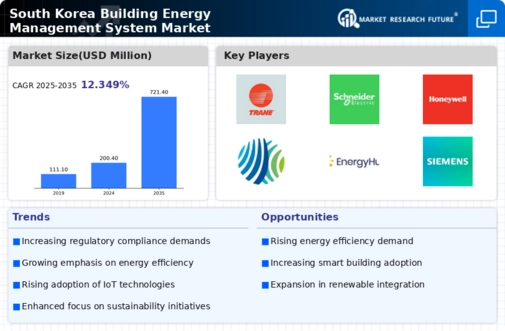The building energy-management-system market in South Korea is characterized by a dynamic competitive landscape, driven by increasing energy efficiency demands and regulatory pressures for sustainability. Major players such as Schneider Electric (FR), Johnson Controls (US), and Honeywell (US) are at the forefront, each adopting distinct strategies to enhance their market positioning. Schneider Electric (FR) emphasizes innovation through its EcoStruxure platform, which integrates IoT technology to optimize energy consumption. Meanwhile, Johnson Controls (US) focuses on regional expansion and strategic partnerships, enhancing its service offerings in smart building technologies. Honeywell (US) is leveraging digital transformation initiatives to streamline operations and improve customer engagement, collectively shaping a competitive environment that prioritizes technological advancement and sustainability.
Key business tactics within this market include localizing manufacturing and optimizing supply chains to enhance responsiveness to regional demands. The competitive structure appears moderately fragmented, with several key players exerting influence over market dynamics. This fragmentation allows for a diverse range of solutions, catering to various customer needs while fostering innovation through competition.
In September 2025, Schneider Electric (FR) announced a partnership with a leading South Korean tech firm to develop advanced energy analytics solutions. This collaboration is poised to enhance Schneider's capabilities in delivering tailored energy management solutions, thereby strengthening its foothold in the region. The strategic importance of this partnership lies in its potential to leverage local expertise and accelerate the deployment of innovative technologies.
In October 2025, Johnson Controls (US) launched a new suite of energy management tools specifically designed for the South Korean market. This initiative reflects the company's commitment to addressing local energy challenges and aligns with national sustainability goals. By introducing these tools, Johnson Controls (US) aims to enhance operational efficiency for its clients, thereby reinforcing its competitive edge.
In August 2025, Honeywell (US) unveiled a new AI-driven platform aimed at optimizing building energy consumption. This platform integrates machine learning algorithms to predict energy usage patterns, allowing for more efficient energy management. The introduction of this technology signifies Honeywell's focus on digitalization and positions the company as a leader in innovative energy solutions.
As of November 2025, current trends in the building energy-management-system market are heavily influenced by digitalization, sustainability, and AI integration. Strategic alliances among key players are increasingly shaping the competitive landscape, fostering innovation and enhancing service delivery. Looking ahead, competitive differentiation is likely to evolve from traditional price-based competition to a focus on technological innovation, reliability in supply chains, and the ability to deliver sustainable solutions. This shift underscores the importance of adaptability and forward-thinking strategies in maintaining a competitive advantage.




















Leave a Comment